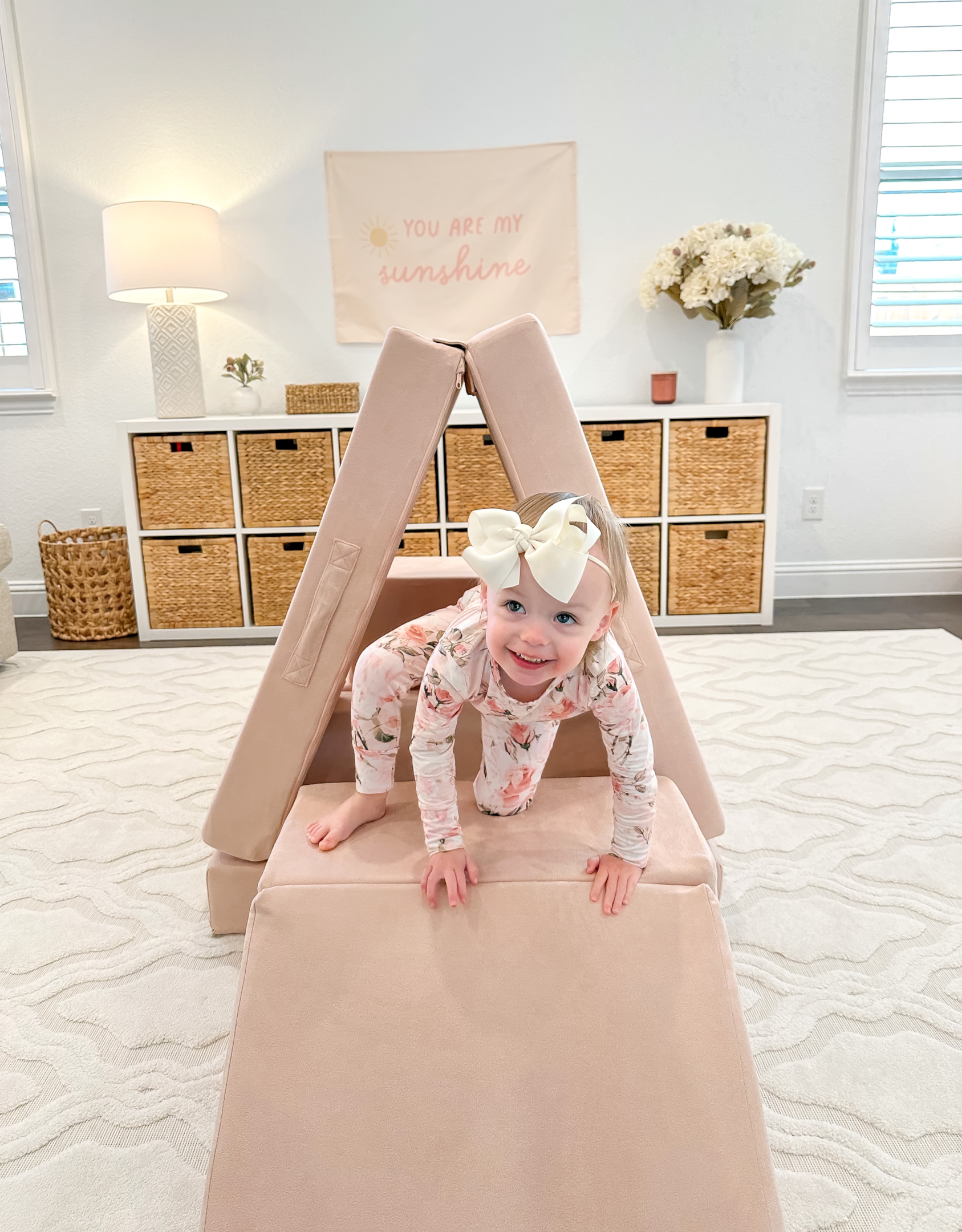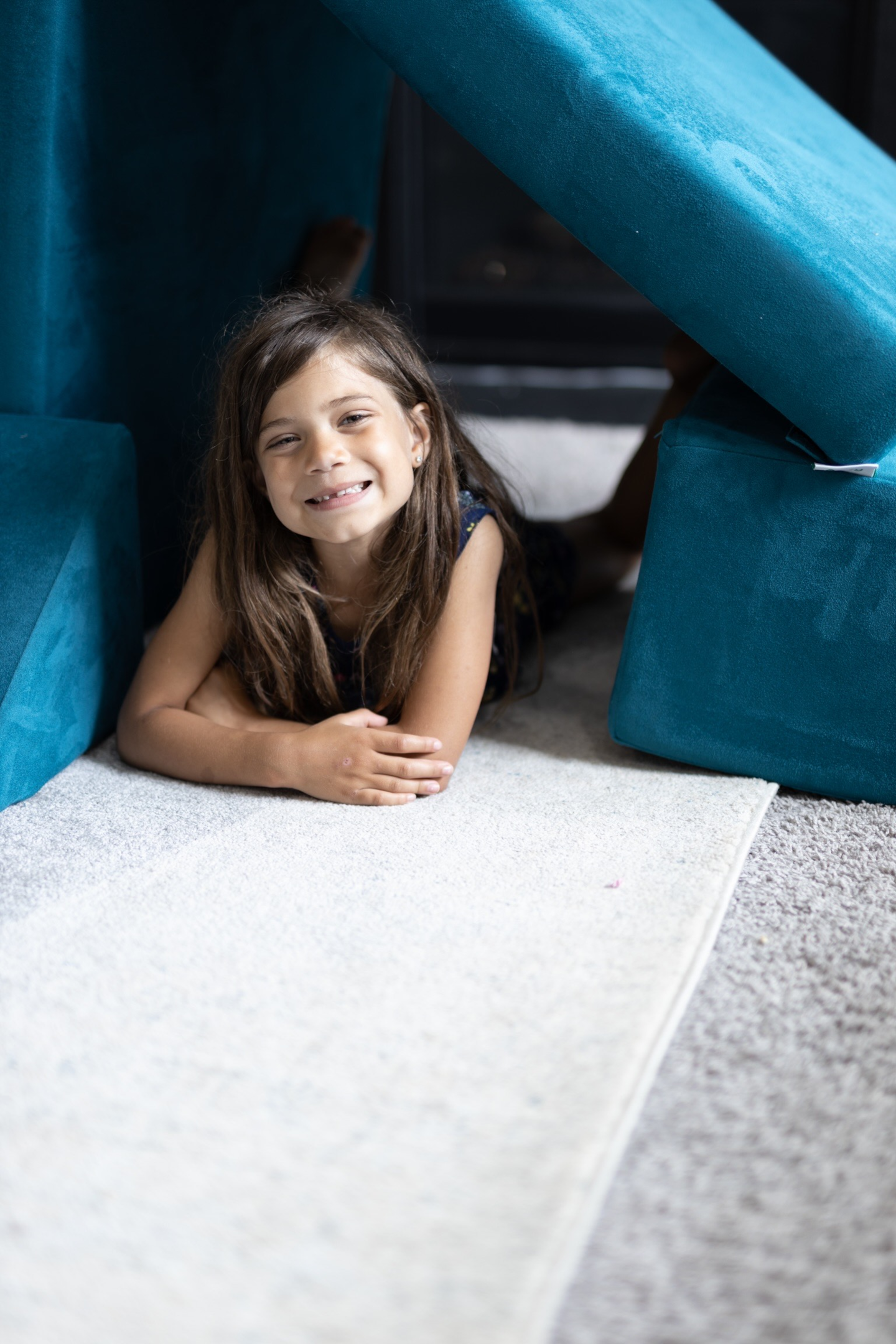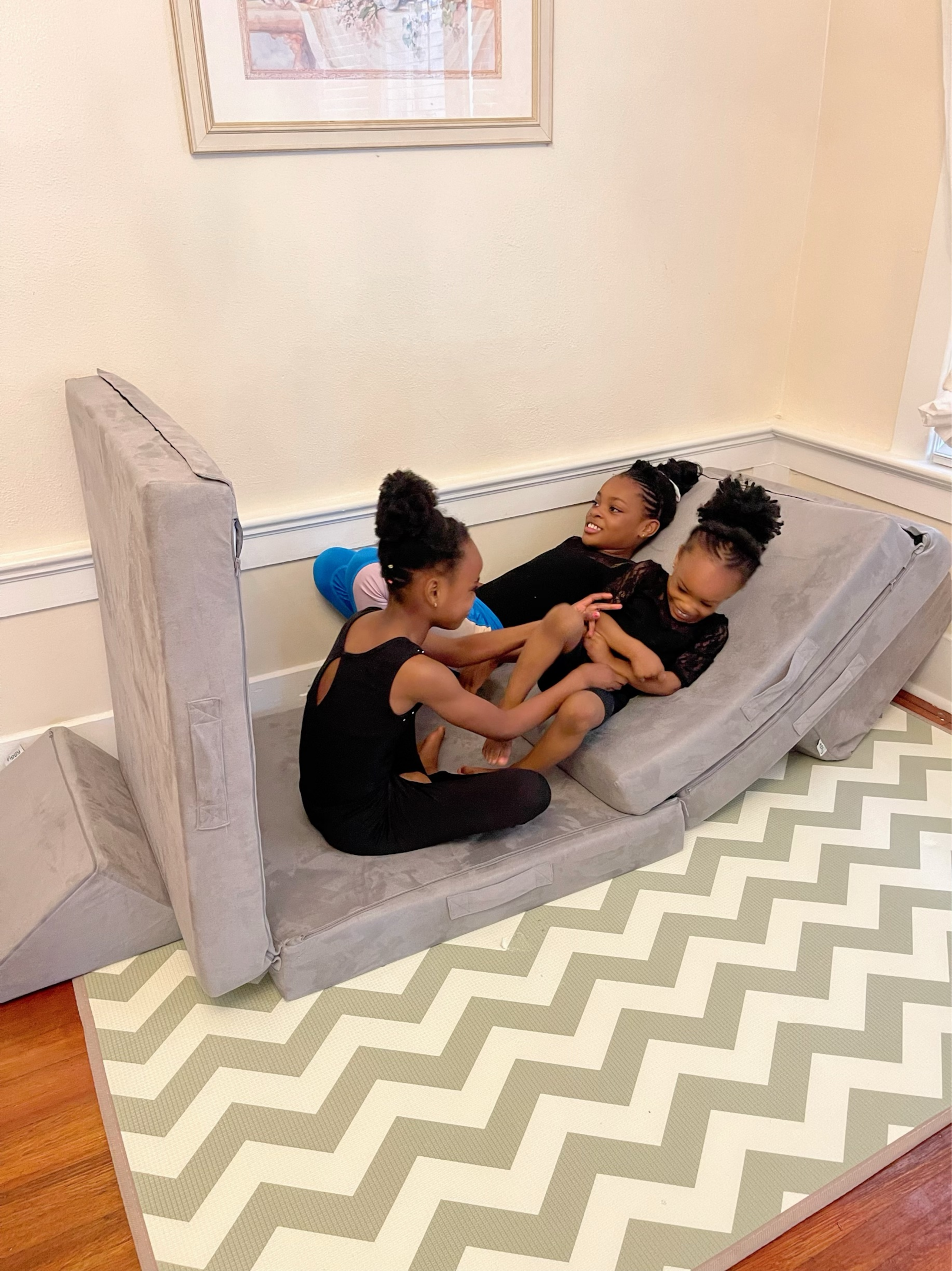You may have heard the term "play couch" recently and wondered, what exactly is that and why would I need it? We are hear to give you a quick dive into the world of play couches, introduce you the the Figgy play couch, and see how your baby, toddler, or kid will benefit from this open-ended toy.
Key Takeaways
-
Play couches are versatile, open-ended toys and seating that help encourage creative play, motor skills development, and cognitive growth.
-
From blending into a the space they are in when not in use, and creating a blank canvas for play time, they are the centerpiece of creative play and imagination! When not in use, they are designed to look like seating but easily come apart to build cool things like forts and ramps!
-
Incorporating play couches with other toys can be a great way to encourage independent play and exploration. One day the play couch might be a rocket ship and then next a home for Calico Critters. It's the stage for a performance and a safe spot to hide away and take some space.
The Magic of Play Couches

Play couches aren't just pieces of furniture. They’re a launchpad for imaginative play, a catalyst for creativity, and a safe haven for the development of gross motor skills. We love seeing kid's pretending to cook dinner for their friends or constructing an epic fort from the cushions. All this while they’re jumping, climbing, and exploring in a controlled environment that is both safe and comfortable.
Most play couches are designed to be light yet durable, and designed to sustain the boundless energy and imagination of children. The versatility of these play couches transforms them into different structures, fostering the magic of pretend play where your child can be:
-
a knight defending a fortress
-
a chef creating a culinary masterpiece at their own diner
-
a princess in her castle
-
a race car driver on a race track
And so much more!
Essentially, play couches serve as an imagination playground, promoting open-ended play and inspiring children to:
-
concoct their own games and narratives
-
engage in pretend play
-
develop problem-solving skills
-
enhance creativity and imagination
So, not only are they having fun, but as children learn, they’re also nurturing their creative side and developing essential skills in the process.
Versatility and Flexibility
Play couches also help with children’s social interactions. They help facilitate diverse activities like cooperative play, negotiation, and role-playing. Think of the endless possibilities when these couches are connected with other pieces, like a second play couch, piklar triangle, or Brainrich gym creating a creative playground of imaginative play setups.
Furthermore, these couches offer versatility that goes beyond merely play. They can easily be integrated into the family lifestyle, functioning as both a play space for kids and secondary seating for the home, providing a flexible solution for family rooms.
Want to extend the play experience? Try pairing the couch with puzzle mats or soft flooring for a more comfortable setting for a myriad of activities.
Encouraging Open-Ended Play
The real magic unfolds during open-ended play. It’s a realm where children are free to explore and experiment without specific goals, fostering independent problem-solving and creativity. Play couches serve as the perfect platform for this type of play, sparking curiosity, adventure, and imagination in children.
They not only foster individual play but also inspire cooperative activities. Engaging in these activities helps children develop crucial social skills such as sharing, negotiation, and leadership. Spark their creativity further by introducing soft toys, safe objects, or DIY elements like cardboard boxes.
Better yet, incorporate indoor tents or teepees to create cozy reading nooks or imaginative hideaways.
Enhancing Cognitive and Emotional Development

Play couches serve as more than just a source of fun and games; they are developmental tools that boost children’s cognitive abilities. They can improve gross motor skills and cognitive development. More importantly, they facilitate open-ended play, a crucial practice for honing problem-solving skills that are key for children’s success in school and life.
Play couches provide a stage for children to understand and navigate their emotions. They offer opportunities for emotional expression during pretend play, helping children to comprehend their feelings better. These play structures contribute to social interactions and emotional regulation, both of which are critical aspects of emotional development in early childhood. For example, kids may learn to work together or through frustrating moments when attempting to build a fort.
Problem Solving Skills

As children construct a variety of structures such as forts, castles, and spaceships with play couches, they’re not only enjoying themselves but also cultivating crucial problem-solving skills. They are learning to think through a problem and come up with a solution.
The exploration of various configurations and possibilities with play couches contributes to a child’s cognitive development, particularly in critical thinking and problem-solving domains. Arranging play couch cushions into different layouts, like obstacle courses, challenges children to think critically about navigation, thereby practicing problem-solving skills in a physical context.
Moreover, play couches promote spatial awareness, fine motor skills, and promotes physical development, crucial for the development of problem-solving abilities, through their inherent requirement for physical manipulation and assembly.
Language Development
Play couches offer an optimal environment conducive to language development. As children invent new words and phrases in imaginative scenarios, their language skills are enriched. Interactive storytelling on play couches can boost children’s language and creativity as they engage in turn-taking and use animated expressions to convey the story.
Mini theatrical performances on play couches promote language skills through practicing expressive speaking, memorizing scripts, and using descriptive language in their own plays. When combined with role-play toys, play couches enable children to enhance their storytelling and social skills, supporting further language acquisition.
Emotional Skills
Play couches act as a stage where children can display various emotions, an integral part of emotional literacy development. Through role-play and creative play scenarios, children can act out various emotions, gaining skills in emotional regulation and a better understanding of their feelings.
In addition to supporting emotional expression and regulation, play couches can also act as a calming environment that promotes mindfulness and relaxation. Having a safe space to express their emotions freely can be instrumental in helping children understand and manage their feelings better.
Encouraging Independent Play
Play couches endorse independent play, offering children the liberty to delve into their interests and solve problems. This freedom nurtures creativity and fosters a sense of accomplishment. By setting up a play couch in a safe and accessible area, children can explore and play independently, creating their own little world of imagination.
Establishing a specific time for independent play can create a routine, allowing children to enjoy their playtime without the constant need for adult supervision. Visual or auditory cues can signal the start and end of these sessions, giving them a sense of structure. Encouraging children to tidy up after playing with the play couch fosters a sense of responsibility and further supports independent play.
Fundamentally, the combination of play couches with other toys can significantly augment the play experience, fostering imaginative scenarios and stimulating boundless creativity.
Frequently Asked Questions
What is indoor play?
Indoor play is not just sitting around staring at a screen. It includes activities like arts and crafts, board games, puzzles, and going to or creating an indoor playground.
How much screen time is unhealthy?
Spending six hours or more per day on screens has been linked to a higher risk for depression, while limiting social media use to 30 minutes per day can lead to a significant improvement in well-being. The type and quality of screen time also matter.
How do I become a screen free parent?
To become a screen-free parent, lead by example by limiting your own screen time and setting clear limits and boundaries for your child's screen time. This will help to encourage alternative ways of spending time.
What is screen free time?
Screen free time is when you set designated days to prioritize physical activity, reading, and quality time together, without any screens. It's also about setting limits on screen usage, like no video games on school nights or turning off electronic devices during dinner.
What is a play couch?
A play couch is a piece of furniture/toy that kids can use to create imaginative structures like forts and castles, encouraging creativity and physical activity. It's a great addition to a playroom or kids' space.

